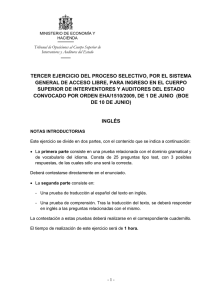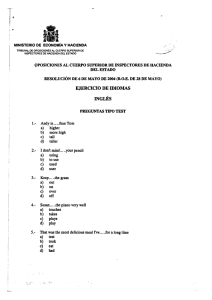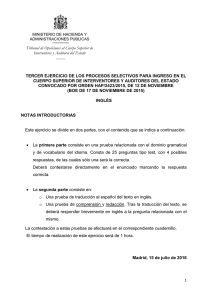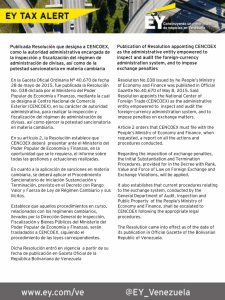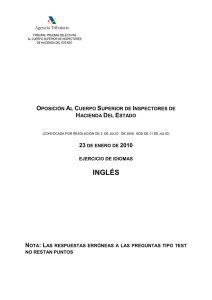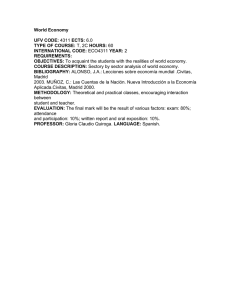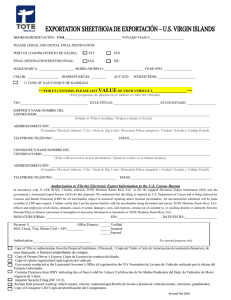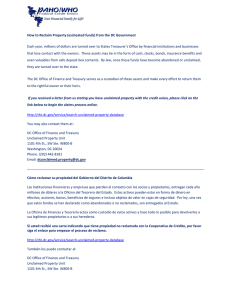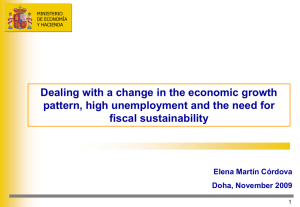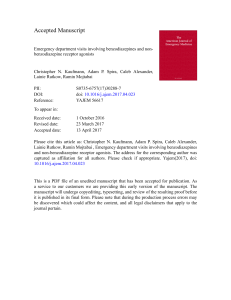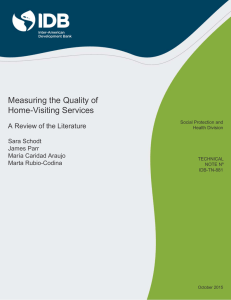pdf 58 kb
Anuncio
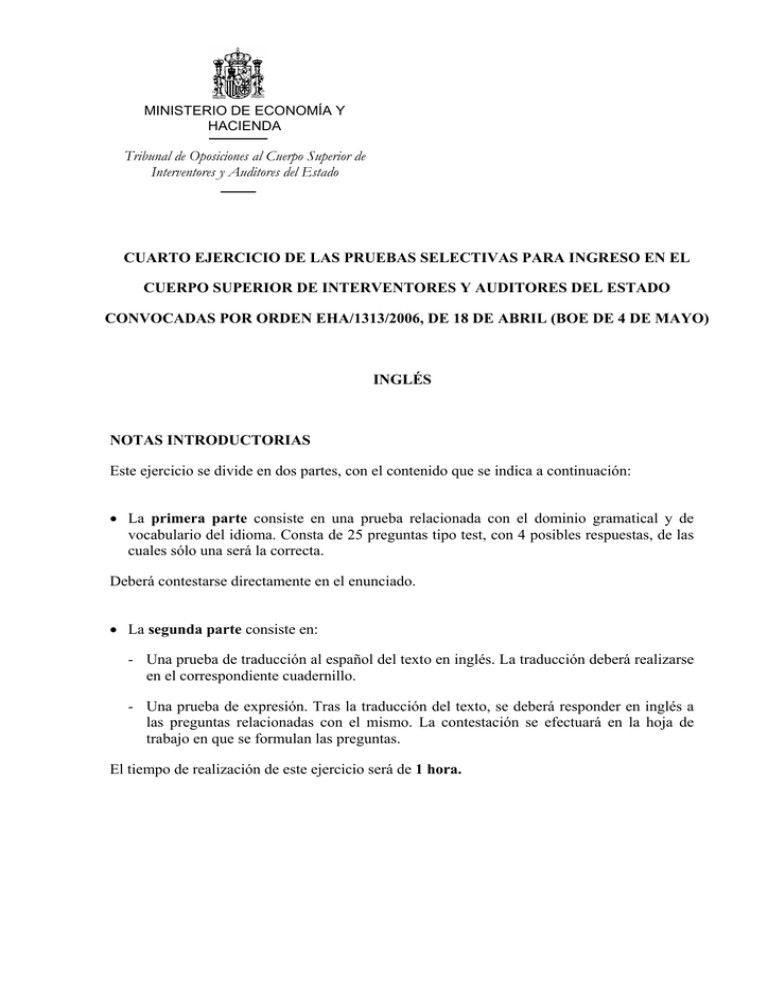
MINISTERIO DE ECONOMÍA Y HACIENDA Tribunal de Oposiciones al Cuerpo Superior de Interventores y Auditores del Estado CUARTO EJERCICIO DE LAS PRUEBAS SELECTIVAS PARA INGRESO EN EL CUERPO SUPERIOR DE INTERVENTORES Y AUDITORES DEL ESTADO CONVOCADAS POR ORDEN EHA/1313/2006, DE 18 DE ABRIL (BOE DE 4 DE MAYO) INGLÉS NOTAS INTRODUCTORIAS Este ejercicio se divide en dos partes, con el contenido que se indica a continuación: • La primera parte consiste en una prueba relacionada con el dominio gramatical y de vocabulario del idioma. Consta de 25 preguntas tipo test, con 4 posibles respuestas, de las cuales sólo una será la correcta. Deberá contestarse directamente en el enunciado. • La segunda parte consiste en: - Una prueba de traducción al español del texto en inglés. La traducción deberá realizarse en el correspondiente cuadernillo. - Una prueba de expresión. Tras la traducción del texto, se deberá responder en inglés a las preguntas relacionadas con el mismo. La contestación se efectuará en la hoja de trabajo en que se formulan las preguntas. El tiempo de realización de este ejercicio será de 1 hora. MINISTERIO DE ECONOMÍA Y HACIENDA Tribunal de Oposiciones al Cuerpo Superior de Interventores y Auditores del Estado PRIMERA PARTE Choose the correct option: 1) He usually ………… mineral water for lunch. a) b) c) d) drinks drink is drinking drunk 2) Hi, Jane! You ………… sad! What’s up, lass? a) b) c) d) are looking look looked will look 3) If I ………… Superman, I ………… all over the world without paying a single plane ticket. a) b) c) d) was/ fly were/ would fly were/ will fly was/would be flown 4) Leif Ericson ………… Vinland while he ………… towards the west. a) b) c) d) has discovered/ were sailing discovered/ sailed has discovered/ was sailing discovered/ was sailing 5) Look! She ………… from the bottle! How impolite of her! a) b) c) d) drinking is drinking drinks would drink MINISTERIO DE ECONOMÍA Y HACIENDA Tribunal de Oposiciones al Cuerpo Superior de Interventores y Auditores del Estado 6) The west coast search-and-rescue helicopter ………… from Shannon Airport every day at the same hour. a) b) c) d) takes on takes about takes off takes in 7) By the time the exhausted crew had ………… the two almost drowned members of the boat from the sea, the helicopter was running out of fuel. a) b) c) d) picked out picked up taken over taken off 8) Reduce! Re-use! Recycle! The message hits Canadian ………… through all the media, 24 hours a day. a) b) c) d) customers consumers clients buyers 9) My partner Shahid and I used to have a cane basket we ………… with us to the Sunday market every week. a) b) c) d) took over took away took along took up 10) When income ………… are low, people need to buy in small quantities. a) b) c) d) rates amounts sizes levels MINISTERIO DE ECONOMÍA Y HACIENDA Tribunal de Oposiciones al Cuerpo Superior de Interventores y Auditores del Estado 11) A new survey proves that the ………… the hotel’s star rating, the greater its bill for thieving guests. a) b) c) d) bigger higher more expensive more famous 12) One guest at the Seacrest Hotel in Hampshire complained to the tourist board about the hurricane that had ………… him awake. The roof of the hotel had blown off. a) b) c) d) held brought made kept 13) For every person who takes a ………… by bike rather than by car, there is less pollution, less fuel used and one healthier person. a) b) c) d) journey travel trip drive 14) In the US there are fewer bicycles than cars ………… in China there are 250 times as many! a) b) c) d) as while unlike compared 15) Many things ………… this month. a) b) c) d) would change didn’t change changed have changed MINISTERIO DE ECONOMÍA Y HACIENDA Tribunal de Oposiciones al Cuerpo Superior de Interventores y Auditores del Estado 16) The weather forecast says the sun ………… tomorrow for sure. a) b) c) d) shines may shine is going to shine will shine 17) We ………… my aunt on Friday next week. It’ll be a very formal visit, similar to an appointment with the doctor. a) b) c) d) have visited visited are visiting will be visiting 18) Which books ………… to school every Tuesday? a) b) c) d) will you take did you take do you take might you take 19) I’ve found the dishwasher so useful that I don’t think I could ………… without it now. a) b) c) d) go pass get do 20) Mark was ………… that he should apply for a university place. a) b) c) d) suggested advised recommended explained MINISTERIO DE ECONOMÍA Y HACIENDA Tribunal de Oposiciones al Cuerpo Superior de Interventores y Auditores del Estado 21) How much do you need to spend ………… books for your course? a) b) c) d) for with on in 22) He’s been trying to persuade his father ………… him a bike. a) b) c) d) buy buying to buy for buying 23) The ………… market is things which are bought and changed illegally. a) b) c) d) obscure black sunk silent 24) Don’t forget that ………… to our new office by the time you get back from holiday. a) b) c) d) I’m moving I’ll move I’ll have moved I’ll be moving 25) A ………… price shop sells things at lower prices than in normal city shops. a) b) c) d) second low down cut MINISTERIO DE ECONOMÍA Y HACIENDA Tribunal de Oposiciones al Cuerpo Superior de Interventores y Auditores del Estado SEGUNDA PARTE TRANSLATION The Commission shall ensure a permanent dialogue with Member States’ statistical authorities To this end, the Commission (Eurostat) will carry out in all Member States regular dialogue visits, as well as possible methodological visits. The methodological visits should only be undertaken in cases where substantial risks or potential problems with the quality of the data are identified, especially as they relate to the methods, concepts and classification applied to the data, which Member States are obliged to report. The dialogue visits are designed to review reported data, to examine methodological issues, to discuss statistical processes and sources described in the inventories and to assess compliance with the accounting rules. The dialogue visits should be used to identify risks or potential problems about the quality of the reported data. The methodological visits are designed to monitor the processes and the government accounts which justify the reported actual data and to draw detailed conclusions as to the quality of reported data, as defined in Article 8a(1). The methodological visits should not go beyond the purely statistical domain. This should be reflected in the composition of the delegations referred to in Article 8e. When organising dialogue and methodological visits, the Commission (Eurostat) shall transmit its provisional findings to the Member States concerned for comments. MINISTERIO DE ECONOMÍA Y HACIENDA Tribunal de Oposiciones al Cuerpo Superior de Interventores y Auditores del Estado When carrying out methodological visits in Member States, the Commission (Eurostat) may request the assistance of national accounts’ experts, proposed by other Member States on a voluntary basis, and of officials from other Commission departments. The list of national accounts’ experts from which the Commission may request assistance will be constituted on the basis of proposals sent to the Commission by the national authorities responsible for the excessive deficit reporting. Without prejudice to the general obligation of the Member States to take all measures required to facilitate the methodological visits, the interlocutors of Eurostat for the methodological visits referred to in the first subparagraph are, in each Member State, the services responsible for the excessive deficit procedure reporting. MINISTERIO DE ECONOMÍA Y HACIENDA Tribunal de Oposiciones al Cuerpo Superior de Interventores y Auditores del Estado HOJA DE TRABAJO QUESTIONS 1) Who organises the dialogue between the State Members’ statistical authorities? 2) Which are the differences between the dialogue visits and the methodological visits? Fill in the following chart using your own words. Do not copy from the text. Dialogue visits Frequency Visit reasons Visit objectives 3) Are these visits really necessary? Justify your answer. Methodological visits
